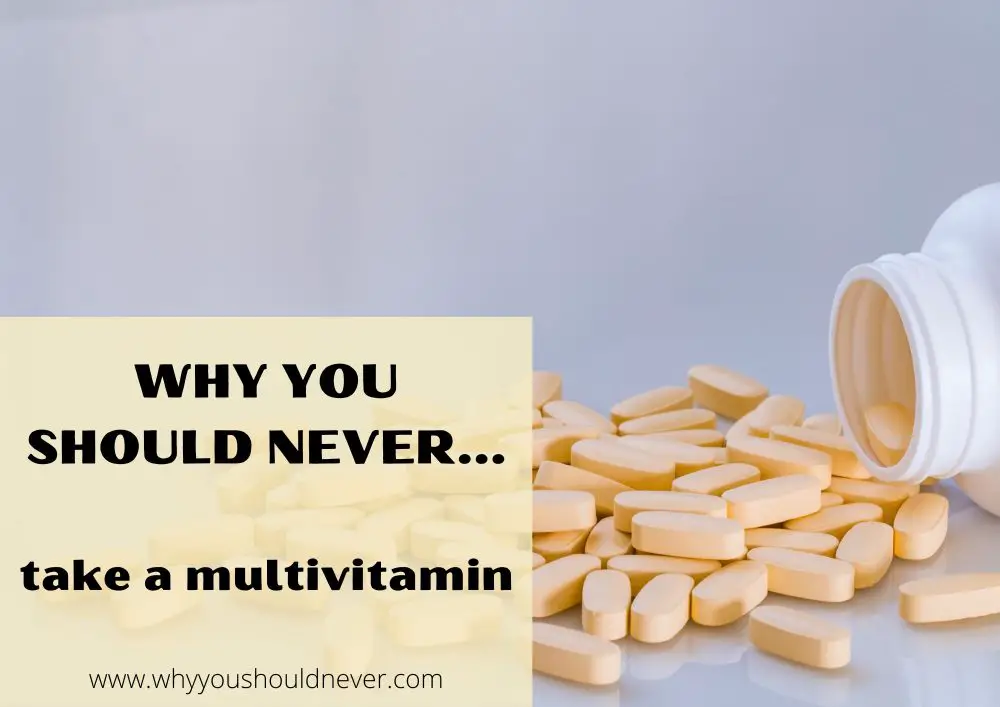![]()
Why You Should Never Take A Multivitamin
Multivitamins have become a go-to health supplement for many people. The promise of getting all the essential vitamins and minerals in one convenient pill seems like a no-brainer, especially in our fast-paced modern world where healthy eating habits can be a challenge.
However, recent studies have shown that taking a multivitamin may not be as beneficial as we once thought. Let’s explore some of the downsides of relying on multivitamins for our nutritional needs.
8 reasons why you shouldn’t take multivitamins
1. Overdosing on vitamins
While it may seem like taking a multivitamin can help us make up for nutritional gaps in our diets, it’s important to remember that too much of a good thing can be harmful. Many multivitamins contain high doses of certain vitamins, such as A and E, which can accumulate in the body and potentially lead to toxicity.
2. No tailored nutritional plan
Each person has unique nutritional needs based on factors such as age, gender, and health status. A multivitamin may not necessarily cater to these individual needs, and taking one blindly may result in deficiencies or imbalances in certain vitamins and minerals.
3. Not a substitute for a healthy diet
Taking a multivitamin should not be seen as a replacement for a healthy and balanced diet. While a multivitamin can provide some essential nutrients, it can’t replace the benefits of eating a variety of nutrient-rich foods.
Sadly, too many people rely on multivitamins as a way to justify unhealthy eating habits. A pill can’t replace the benefits of whole foods, such as fiber, antioxidants, and other nutrients that work together to promote overall health.
4. They can interfere with medications
Certain vitamins and minerals can interact with prescription medications, causing potential harm. For example, vitamin K can interfere with blood thinners, and calcium can interfere with certain antibiotics.
So, if you’re on any medications, you need to consult with your doctor before taking a multivitamin.
5. Not enough vitamins
The converse of point 1 is also true: some multivitamins may not provide enough of certain vitamins and minerals. For instance, many multivitamins may only contain the minimum recommended daily intake of vitamin D, which is likely not enough for many people.
This is to be expected since a multivitamin is a one-size-fits-all solution, and it may not cater to the specific needs of each individual. Also, for the pill to contain adequate amounts of all the essential vitamins and minerals, it would need to be quite large and difficult to swallow.
6. Some vitamins won’t be absorbed well
Some vitamins and minerals are not well-absorbed in pill form, meaning that the body may not be able to utilize them effectively.
For instance, calcium carbonate, a common form of calcium found in many multivitamins, requires stomach acid for proper absorption. However, many people, especially older adults, may have low stomach acid levels, making it difficult for them to absorb calcium efficiently.
Similarly, some forms of vitamin B12 found in multivitamins are not easily absorbed by the body and may require a different delivery method, such as an injection or sublingual tablet.
7. Cost
Well, you didn’t expect a pill that contains all the essential vitamins and minerals to be cheap, did you? Multivitamins can be quite costly, especially if you opt for a high-quality product that contains bioavailable forms of the nutrients.
While it’s true that good health is priceless, it’s important to consider whether the cost of a multivitamin is worth it when there are other ways to obtain the same nutrients through a healthy diet.
8. Unnecessary
Believe it or not, you might not even need to take a multivitamin to stay healthy. Many people who do take them don’t actually need them.
If you’re eating a healthy and varied diet, you’re likely already getting most of the essential vitamins and minerals your body needs.
Of course, there are exceptions, such as pregnant women, older adults, and people with certain medical conditions, who may require additional nutrients. But if you’re none of the above and you eat healthily, taking a multivitamin might just be a waste of money and time.
Conclusion
We humans are always looking for quick fixes and shortcuts, and multivitamins are the health supplement equivalent of that. However, when it comes to our health, there are no shortcuts or easy solutions.
A healthy diet, regular exercise, and good sleep are the pillars of good health, and while multivitamins may have their place in certain situations, they should not be relied upon as a substitute for a healthy lifestyle.
